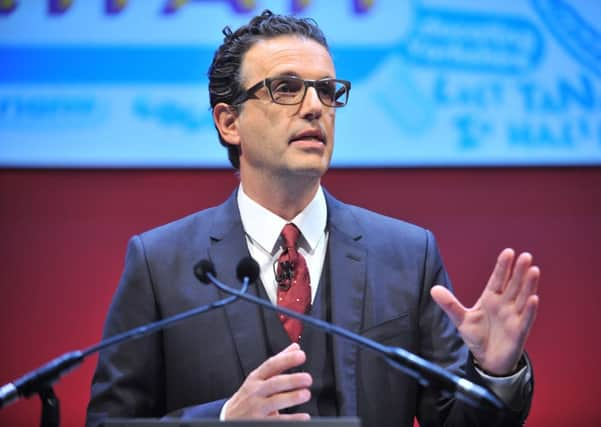TV boss urges UK boost public service broadcasting


David Abraham, 49, told a packed audience at the prestigious McTaggart Lecture how Channel 4 will maintain its cultural impact in a changing digital world and how independents most be protected and nurtured in order to sustain creative risk for the next generation.
He called for a two-pronged approach from the government in order to strengthen the public service broadcasting (PSB) system by way of a fair deal on platform relations and terms of trade.
Advertisement
Hide AdIn regards the current arrangement between PSBs and pay TV platforms such as Sky, he asked: “How much do you think the pay TV platforms pay for the most popular services - the core PSB channels? I’ll tell you - zero. The UK is one of very few major markets in the world where public service broadcasters receive no payment for the immense value their channels bring to pay TV platforms.
“We need regulation at a minimum to act as a backstop if the parties cannot reach an independent agreement. I look forward to discussing this with Ofcom and the government in the months ahead. I commit here and now that Channel 4 will reinvest all of the proceeds of a fair deal back into commissioning more original UK content.”
This was the first MacTaggart speech by a Channel 4 chief executive since Mark Thompson in 2002; other former speakers have included Kevin Spacey, Elisabeth Murdoch, Michael Grade and Rupert Murdoch.
Earlier this week it was revealed that Channel 4 was getting into TV production for the first time in its 32-year history, buying minority stakes in four independent producers, suchas those responsible for Oscar-winning documentary Man on Wire and MTV reality show The Valleys.
The publicly-owned broadcaster spent £4 million to purchase stakes of up to 25% in the companies, the first investments from a £20m fund that aims to help the growth of small and medium-sized independent producers.
Channel 4 has invested in Lightbox, founded by Simon Chinn, the Academy Award-winning producer behind documentaries Searching for Sugar Man and Man on Wire; Arrow Media, a specialist in the factual programming field with credits including Channel 4’s Dogs: Their Secret Lives and BBC2’s Jumbo: the Plane that changed the world.
Advertisement
Hide AdThe other companies it has taken a stake in are Popkorn, maker of shows including Sky1’s Football behind Bars, Channel 4’s Living with my Stalker and Channel 5’s My Violent Child; and True North, which makes MTV’s Welsh reality show The Valleys and the BBC’s Animal SOS.
The broadcaster said that the deals come with no strings attached in terms of “first look” deals on shows or distribution rights.
Advertisement
Hide AdMr Abraham touched on the the subject when the told the 2000-capacity McTaggart Lecture that Channel 4 does not intend to follow others such as the BBC and ITV and set up in-house production but that the move is designed to protect the “health and diversity of the indie sector which is critical to Channel 4, because of our reliance on it for our lifeblood.”
He also spoke of his fears in regards diversity of ownership on both the supply and the buying side of the industry highlighting how Channel 5 now “takes its orders from Viacom in New York”, Liberty “playing footsie” with ITV and Colorado-based Dr John Malone controlling the UK’s paid cable platform Virgin Media.
Abraham added: “It may be on hold for now but if Fox, Time Warner and Shine/Endemol all merge, how long before that would subsume Sky Europe, presumably all taking sensitive nuanced direction from a Mardoch in New York? By the way such an entity would have combined revenues three and a half times the size of the entire UK television industry. But what duties or obligations will these new global gated communities have towards our industry whose future they increasingly influence?”
He also spoke passionately about how the PSB system is on the verge of becoming a victim of its own success as the creativity on which it thrives, namely the independent sector “is being snapped up almost wholesale and acquired by global networks and private equity investors at a faster rate than tickets to a public flogging of Jeremy Clarkson.”
It is estimated that soon the proportion of turnover of UK production that will qualify as ‘independent’ will drop from 76 per cent to around 50 per cent and it is through more robust regulation that Abraham believes the government and Ofcom can devise measures to ensure a healthy and diverse market for programme supply in the future.
SEE ALSO